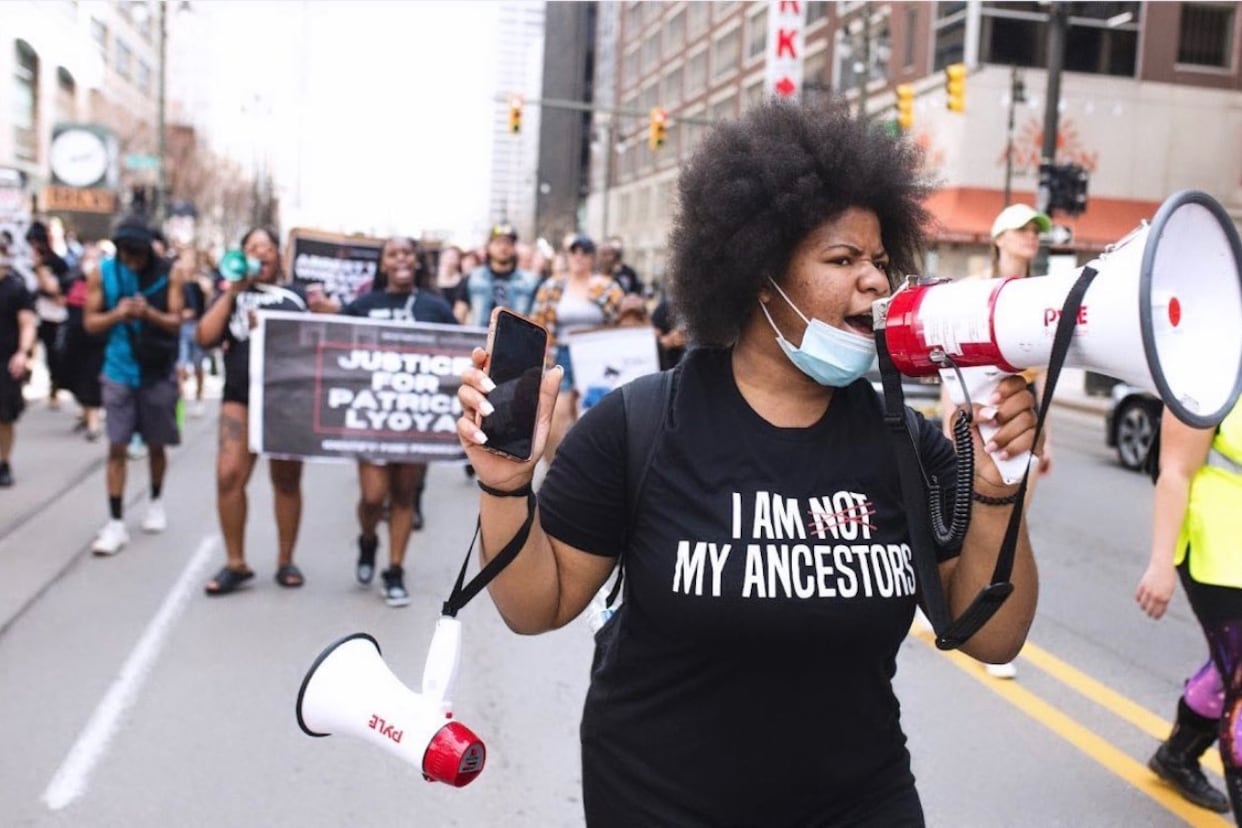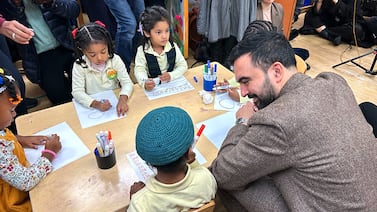As a voice for Detroit students, Perriel Pace has been unafraid to call attention to important issues facing her peers — whether or not adults want to hear about them.
An 11th-grader at Martin Luther King Jr. Senior High School, Pace just completed a nearly one-year term as a student representative to the Detroit Public Schools Community District’s school board, where she pressed the district to address concerns such as student mental health, transportation challenges, and more.
Perriel got her introduction to activism through an art project, but she now works on behalf of a dozen youth-led organizations, including Detroit Heals Detroit, 482Forward, Young Voices Action Collective, and MIStudentsDream, and she advocates for causes including youth empowerment, immigration rights and restorative justice.
With her school board role complete, she spoke with Chalkbeat about how young people can get more involved in advocacy, as well as how she responds to criticism, and what the district can do to help students.
This interview has been lightly edited for length and clarity.
What or who got you into organizing and activism?
It is so random, but my art teacher, Ms. Loomis, who is also my godmother, we painted a mural one day, and a group of kids we were working with said (they’re) with an organization which focuses on transforming trauma into power. I decided to join them, and my career kind of took off from that, because they introduced me to all these other kinds of organizations doing great work. And the next thing I know I sit on 13 organizations.
Does it feel unique for you to be a student organizer or a youth advocate?
When I first started, I thought that I was literally the first … youth leader that I knew. So I kind of carried my title with so much pride. And then I got into these other organizations, these other spaces, and I’m like, “OK, there’s a lot more of us. So everything doesn’t have to be a burden on me.” In the past couple of years, I came across a lot of youth who are excellent leaders. And you know, it’s kind of nice that I don’t have to stand alone. But I do wish that more youth would get involved and be more aware of what’s going on.
What do you think would encourage more youth to get involved in causes?
I would say probably to get them to actually understand what’s happening. I feel like that will motivate more people to do something, especially youth.
What made you decide to join the school board as a student representative?
It was literally so random. We were in a DEYC (meeting), which is the District Executive Youth Council. And a lot of the adults there were just telling me like, “You’d make a good member on that team. You could represent for the district. You do so much in the community.” And I was just like “No, no, politics and stuff like that is not really my cup of tea.”
We had an election process and nobody really stepped up to the plate. So I said I’ll give it a shot. And surprisingly, I did win, but I won as an alternate (representative). So if the other original reps were absent, then I could come into play.
I was watching the student reps on the board, and I noticed they were kind of shy. And I told them, “You’re a student rep. It’s OK to be new to things, but you’re not just here for you. You’re not just representing yourself. You have to speak for everybody.” People saw that, and they bumped me up to one of the main student representatives.
What was that experience like on the school board?
I’m not gonna lie … school board meetings were kind of boring. I was there from 5:30 to 8 p.m. and just listened to (agenda item) numbers and numbers and numbers. It’s like, “Oh my goodness, I’m in school once again.”
Most of the time, I kind of zoned out. I felt like I was kind of there just so they could say we have a student rep on the board.
But then once I started telling them that I need to at least speak, to at least do something … (that) I don’t feel like just sitting there, then they started letting me talk on the mic.
Over time, I got a little bit more comfortable. But then the next thing I know, people started gunning for me in the public comment section.
What was it like when you spoke out at times during the school board meetings and received some criticism from community members?
I wasn’t fazed by it, honestly, because I’m used to being in this space where kids are not being seen or heard. The district staff was very supportive, but as (the public commenters) were talking and responding to me, I was writing down responses, and (the district staff) told me you can’t respond to those comments. That kind of made me frustrated, because I wanted to defend myself. I’m used to giving comebacks. It made me realize a little bit how to let things roll off my back.
But it got to the point where people started coming for me on social media. It was definitely a slightly traumatizing experience, and then to know that it’s grown adults doing it. To have an issue with there not being enough students’ voices being heard is one thing, but when you hear a student’s voice and you immediately antagonize them when they’re saying something you don’t want to hear, that doesn’t make any sense.
What were some of the issues that you brought directly to board members?
My very first concern I brought was about the student representatives, how they were not allowing us to speak really.
My second one was about mental health. How we need more SEL — social emotional learning — between students and teachers in order to better their relationship.
And my third concern was about transportation for students. What are y’all gonna do about the way that transportation is set up? Because for me personally, I get up at 5 in the morning just to get to school on time, and I still get to school late, and the city buses are disgusting. There are creepy men on there. It’s honestly scary, especially for me because I’ve been taking the bus since I was 12.
I talked to them about that, but they didn’t provide me with the answer I was looking for, that they will do something about it, such as contacting DDOT (Detroit Department of Transportation). They just left me on the cliff with that one. So I definitely want to follow up probably later on this school year.
Do you think students have enough of a voice in the district? What do you think would improve that?
I feel like we don’t have enough of a voice. I mean yes, we have the District Executive Youth Council, which meets once a month, but we have issues going on every day. I wish that it could be changed to at least biweekly meetings, where we can actively engage and work on these issues as they are happening.
The district is focused on issues like chronic absenteeism, enrollment, and academic achievement. What are students passionate about?
I don’t care what anybody else says. Our top priority should be student mental health. My attendance is low not because of my bus situation but just because I get up and I’m just like “I don’t want to come to school anymore.” Literally the third day of school, as I walked into the building, I said, “I should drop out,” because I literally didn’t feel motivated anymore to come to school.
I spoke to a few students yesterday who told me that they don’t want to do this anymore. School is mentally draining. It’s not engaging. It doesn’t feel like we’re happy anymore. It’s just work, work, work. We kind of had a crying moment there, because everything we shared was understandable. This is why our attendance is the way it is, because we mentally don’t want to be there. Mentally, we cannot have the capability of doing this work right now. We need a break. A mental break. We barely came out of this pandemic, and we’re barely out of it still.
To my knowledge, King (High School) does have SEL mental health stuff, but I don’t think a lot of people are made aware of it. Or it’s just not appealing in a way to students. I am planning a mental health week for King in January or February to make sure students are aware of what tools are available to them already.
It’s important to build one-on-one relationships with teachers, because even then if you don’t want to say something during class, you can speak with them after. You have someone to confide in.
What do you think would better support students struggling right now?
At my old school (Legacy Academy), we started each school year with SEL — social emotional learning. We did that for about two weeks, just so we could build that relationship with teachers. So we have that one-on-one relationship where at any moment, you can stop and go talk to them if you’re ever feeling down or anything like that.
But now I’m at King and you can’t do that. But it would be nice if we tried to get some of those things happening. We could really use this.
Why do you think students in Detroit feel so drained?
Everybody is going through something different. You’ve got to battle your work, and you’ve got to battle your personal life, and then just even with being in Detroit itself, you’re constantly watching over your shoulder because, again, every day is not promised, and Detroit is chaotic.
You’ve got a lot on your plate. How do you take care of yourself when you’re not constantly studying or organizing?
One thing that I love to do currently is ice skating. I usually just randomly tell folks, “You know what, I’m going to be unavailable for this week.” And I cancel everybody. Turn the phone off, turn off my emails, etc. And I’ll probably go hang out with my best friend, or go ice skating, or go to the movies. Or I love to crochet, so I will just binge watch a show on Hulu or Netflix and I will crochet.
Or I’ll just sleep my day away.
Correction: Dec. 20, 2022: This story has been updated to correct the spelling of Ms. Loomis, the art teacher and godmother to Perriel Pace whose art project led to Perriel’s student activism.
Ethan Bakuli is a reporter for Chalkbeat Detroit covering Detroit Public Schools Community District. Contact Ethan at ebakuli@chalkbeat.org.






